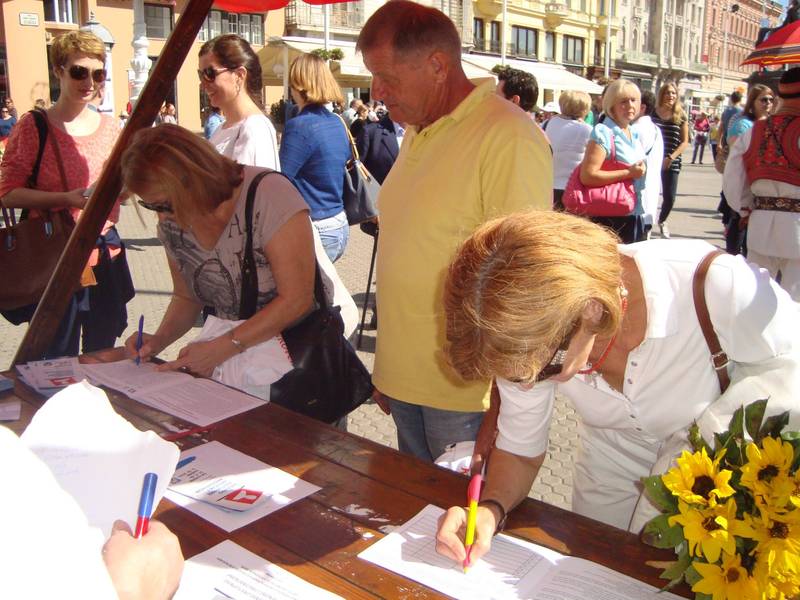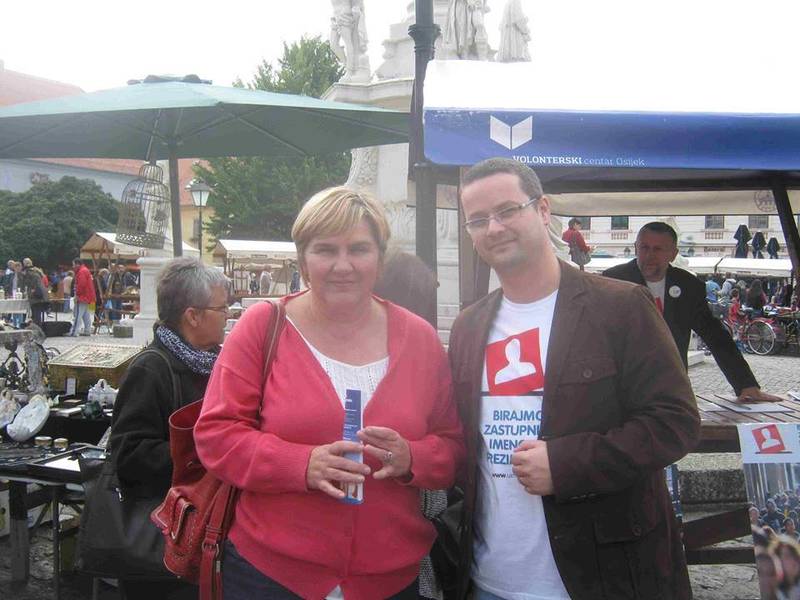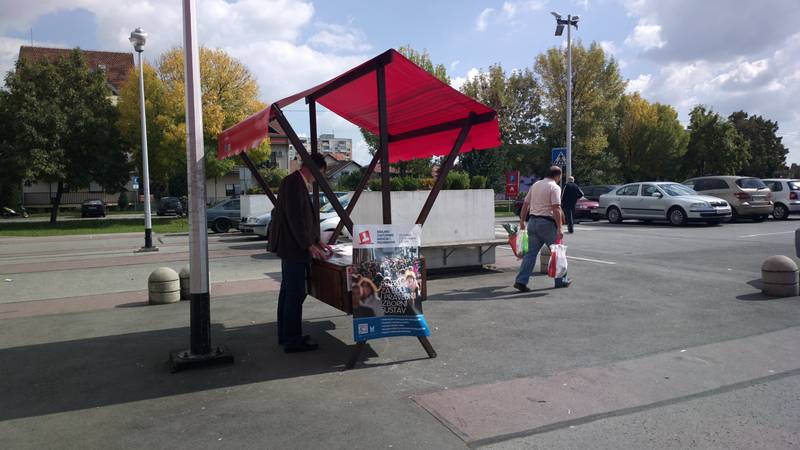Croats Want People not Party Pawns in Parliament
Adelina Marini, October 9, 2014
 While the Bulgarian political parties are analysing the scale of the disaster with the preferential voting at the snap parliamentary elections on October 5th, in Croatia, precisely at midnight (again on October 5th) expired the deadline for collecting signatures to hold a referendum on amending the electoral legislation, one of the aims of which is to introduce preferential voting for the parliamentary elections as well. The initiative was inspired by the second elections for the European Parliament in Croatia which showed strong resistance against what the political parties offer the voters. The taste of preferential voting was for the first time experienced at the elections last year when the Croats had to send for the first time, though for only a year, their official representatives in the European Parliament due to their accession in the EU on July 1st. The preferential voting then seriously upset the calculations of the Croatian Democratic Union (HDZ) which stood in a coalition with several parties, one of which was the Party of Rights Dr Ante Starcevic, led by Ruza Tomasic.
While the Bulgarian political parties are analysing the scale of the disaster with the preferential voting at the snap parliamentary elections on October 5th, in Croatia, precisely at midnight (again on October 5th) expired the deadline for collecting signatures to hold a referendum on amending the electoral legislation, one of the aims of which is to introduce preferential voting for the parliamentary elections as well. The initiative was inspired by the second elections for the European Parliament in Croatia which showed strong resistance against what the political parties offer the voters. The taste of preferential voting was for the first time experienced at the elections last year when the Croats had to send for the first time, though for only a year, their official representatives in the European Parliament due to their accession in the EU on July 1st. The preferential voting then seriously upset the calculations of the Croatian Democratic Union (HDZ) which stood in a coalition with several parties, one of which was the Party of Rights Dr Ante Starcevic, led by Ruza Tomasic.
From the last position on the list, voters raised Ms Tomasic to the top. The situation was repeated and spread among other parties at the European elections this May, which took place across the EU. Then, Tomasic again ended up on top of the HDZ list, which evoked discontent with EPP leadership (because she later joined the ECR group in the EP) and a MEP who turned too independent from his party's policies - Davor Ivo Stier - narrowly managed to return to the European Parliament thanks, again, to preferential voting. The same happened to former foreign minister Tonino Picula who was punished by the leadership of the Social Democratic Party (SDP) of Prime Minister Zoran Milanovic for his close cooperation in the European Parliament with Davor Ivo Stier. Mr Picula was ranked 4th on the Social Democrat's list, but the voters pushed him up to the top.
There were similar cases in the smaller parties as well, although the scale was smaller. The debate about changing the electoral legislation to enable voters rearrange party lists for parliamentary elections as well started last year. The main political parties, however, refuse arguing that changes should not be made before elections - in the end of this year there will be presidential elections and next year are the regular general elections. The whole summer, though, while the ruling coalition was preoccupied counting tourists hoping that they will narrow the, again, rapidly growing budget gap, non-governmental organisations did not rest but were busy preparing draft laws and initiatives for electoral changes.
The association In the Name of Family, who organised the first very successful referendum last year on amending the Constitution to confirm that marriage is a union only between a woman and a man, began in end-September to collect signatures to hold a referendum to change the electoral legislation. Apart from collecting signatures, the association, led by the far conservative female activist Zeljka Markac (very popular in Croatia and enjoying the support of the Catholic church in the country), has proposals of its own. The main message in their campaign is that they want the Croatian citizens to be represented by capable not obedient parliamentarians. Or, as the advertisement goes, "We want MPs with names and surnames".
The association believes that by introducing preferential voting it will be ensured that the MPs will be accountable to the citizens not the political parities. The initiators quote Austria, Sweden, Finland, Belgium, Denmark, Norway, The Netherlands, the Czech Republic, Estonia, Slovakia, Greece as countries where there is preferential voting. Besides, they want the threshold to enter Parliament to be lowered from the current 5% to 3%. They argue that at the 2011 parliamentary elections, 25.7% of the voters voted for lists that did not pass the 5% barrier. This means that 606 356 people, who voted, are not represented in the Sabor (the Croatian national assembly). Moreover, they say from the association, there are MPs who entered undeservedly the Parliament because the ballots of these 25% were distributed among them.
In the Name of Family also proposes changes of the polling sections, introduction of online voting and voting via mail, the parties to stand up in elections alone and form coalitions later. According to them, it is unfair to voters parties that enjoy petty voters' support to enter Parliament. Such is the case, for instance, with a key partner in the ruling Kukuriku coalition - the Croatian People's Party (HNS) of Vesna Pusic, first deputy prime minister and minister of foreign and European affairs - the support for which dropped below 3% in the opinion polls and is seen unable to enter the Sabor on its own. Thanks to its participation in the coalition, however, Pusic's Liberals managed to send one of their own in the European Parliament. Another party with very low electoral support that, too, participates in the ruling coalition is the Party of the Croatian Pensioners (HSU) which, according to the September poll of Crobarometar, enjoys the support of only 2% of Croatian citizens.
Similar is the situation with the opposition HDZ, which has built a coalition of 8 parties. Ruza Tomasic's party, HSP Dr Ante Starcevic, has the support of 3.7% of those polled in the Crobarometar survey which is much below the 5% threshold.
 In the meantime, in the beginning of the autumn session of the Croatian parliament, representatives of the non-governmental organisation GONG with the support of a group of MPs proposed amendments to the electoral legislation, a major part of which are, too, introducing preferential voting for parliamentary elections. In their proposal, a threshold of 5% is proposed for rearrangement of the list and abolishment of the institution "leader of a party list". GONG also proposes a ban for people convicted of specific crimes to stand for members of parliament until their rehabilitation period has expired. They also propose an abolishment of the simultaneous holding of two positions - a member of parliament and a mayor at the same time. They also demand the number of signatures to enable standing up in elections from an electoral unit to be increased from 500 to 1500.
In the meantime, in the beginning of the autumn session of the Croatian parliament, representatives of the non-governmental organisation GONG with the support of a group of MPs proposed amendments to the electoral legislation, a major part of which are, too, introducing preferential voting for parliamentary elections. In their proposal, a threshold of 5% is proposed for rearrangement of the list and abolishment of the institution "leader of a party list". GONG also proposes a ban for people convicted of specific crimes to stand for members of parliament until their rehabilitation period has expired. They also propose an abolishment of the simultaneous holding of two positions - a member of parliament and a mayor at the same time. They also demand the number of signatures to enable standing up in elections from an electoral unit to be increased from 500 to 1500.
For now, none of the proposals have gained the support of the main political parties to whom these pose a serious danger. They are mainly against the lowering of the barrier to 3% and believe that this is being done only to enable Zeljka Markac to become MP. Ms Markac's role is viewed with suspicion in Croatia because it is not completely clear who is behind her. With her first initiative for a referendum on the definition of marriage it was clear that she had the support of the Church but after its success she started to have greater ambitions which she denies.
President Ivo Josipovic, too, announced recently his intention to table an initiative of his own to amend the electoral legislation and will, essentially, propose the same - a reform of the polling stations and introducing preferential voting. His words, however, are perceived as being inspired by the upcoming campaign for the presidential elections as he is a candidate for a second term.
In Bulgaria, in the beginning of the year there was, too, an initiative to hold a referendum on amending the electoral legislation which has happened very often in the past years. Changes are so frequent and so obviously aimed at serving one party or another that the latest amendments were made even when the campaign for this year's European elections had already started, which is a precedent. The initiative, in which very actively participated the incumbent caretaker Prime Minister Georgi Bliznashki, succeeded in collecting the necessary signatures but the parliament has rejected it. In the Name of the Family has managed to collect almost 370 thousand signatures but the Croatian Ministry of Administration says that the needed number to launch a referendum procedure is 450 thousand or 10% of those who have right to vote in line with the registries.
From one referendum on to another
Croatia, in the past two years, has been embraced by a referendum fever. So far, three popular votes have taken place, including a referendum on the country's accession in the EU, because of which the validity threshold was significantly lowered down. There was also an initiative to hold referendum on the introduction of the Cyrillic alphabet in regions with solid Serb minorities but the initiative was rejected by the Constitutional court as unconstitutional. In the end of this week will begin the collection of signatures for a referendum against the concessioning of Croatian motorways and several months ago there was an initiative for a referendum against the proposed by the government outsourcing of utility services to private agencies. Even before the collection of signatures has ended, however, Zoran Milanovic's cabinet withdrew this reform.
Because of the growingly strong appetite for referendums on various issues, the Social Democrats proposed a draft legislation on referenda aimed at limiting the areas to be subjected to such votes, like issues that could endanger the country's values, the constitutional order or could be aimed at revoking European legislation. As the draft was tabled during the campaign on collecting signatures for a referendum on the Cyrillic alphabet, it did not receive much support in Parliament but it is still on the agenda of the Social Democrats. Although the big political parties reject the demanded changes to the electoral legislation they are inevitable. And if parties do not agree with specific proposals they will  hardly survive unless they take into consideration the people's will to have a bigger say on who will represent them in the national parliament the way they do for the European Parliament.
hardly survive unless they take into consideration the people's will to have a bigger say on who will represent them in the national parliament the way they do for the European Parliament.
It is evident, that before elections the president has realised the significance of such a change. It is now time the leaders of the two biggest parties to realise it too - Zoran Milanovic and Tomislav Karamarko. The opinion polls clearly show that a change is necessary because, although the support for HDZ is steadily growing, Mr Karamarko still is among the most disliked politicians. Similar is the situation with Zoran Milanovic. Parties in young democracies, which have not severed entirely the navel string with the communist totalitarianism, are too autonomous from their voters contrary to their dependence on the money of the taxpayers. The time has come to return to the sovereign an adequate to their financial participation share of their rights.
 Kolinda Grabar-Kitarovic | © KGK
Kolinda Grabar-Kitarovic | © KGK Jozo Rados | © European Parliament
Jozo Rados | © European Parliament Aleksandar Vucic, Andrej Plenkovic | © Vlada RH
Aleksandar Vucic, Andrej Plenkovic | © Vlada RH